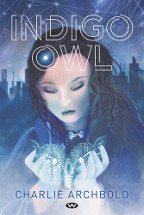Indigo owl by Charlie Archbold

Wakefield Press, 2020. ISBN: 9781743057322.
(Age: 14+) Recommended. Imagine the world has ended and the last of
the human population has escaped to other planets. They are building
a new world but don't want to make the mistakes of the past.
Population on Galbraith has to be controlled with quotas, only one
child per family. That means controlling fertility; the solution on
Galbraith is an anti-pregnancy vaccination. But what if there is
something seriously wrong with the vaccine? Scarlet's mother is a
scientist involved in genetic tests, but now she has disappeared,
despised as a drug addict, and presumed dead. Just as Scarlet is
leaving her home for induction into the elitist Arcadia Institute
her father whispers words of warning, to keep safe from her mother's
enemies.
Thus the reader is drawn into another world where lives are ruled by
a corporation that does not allowing any questioning of its methods.
For different reasons, three young people become drawn together as
they begin to uncover the ruthlessness of the Galbraith Executives.
Scarlet and Dylan are Solitaires with unusual psychic abilities, and
the spirited Rumi is a master of technology. Each is on a quest to
uncover the truth; they have to trust each other, but constant
surveillance puts their lives at risk, and they don't know who else
can be trusted.
Readers of dystopian fiction will enjoy this story that moves
rapidly with interleaving chapters from each of the three main
characters. Archbold has created a futuristic world of holotabs,
catseyes, robots and space pods without lengthy explanations; we
learn how things work as the action draws us along. Similarly we
learn about the different classes of people, the elite Cardinal
group holding the power, the threats to the psychically sensitive
Solitaires, the Malachite scientists and the Willows faithfully
following orders. A central question is the balancing of the needs
of society with the rights of the individual. What if society is
doing something wrong, and a few people find out? When is it
important to obey and when should one speak out?
All the threads of the story come together in a satisfying
conclusion but one can't help but think there is still opportunity
for a sequel and the three friends could be challenged again. I'm
sure there would be a ready audience waiting to read more.
Themes: Science fiction, Dystopia, Population control, Surveillance,
Freedom.
Helen Eddy